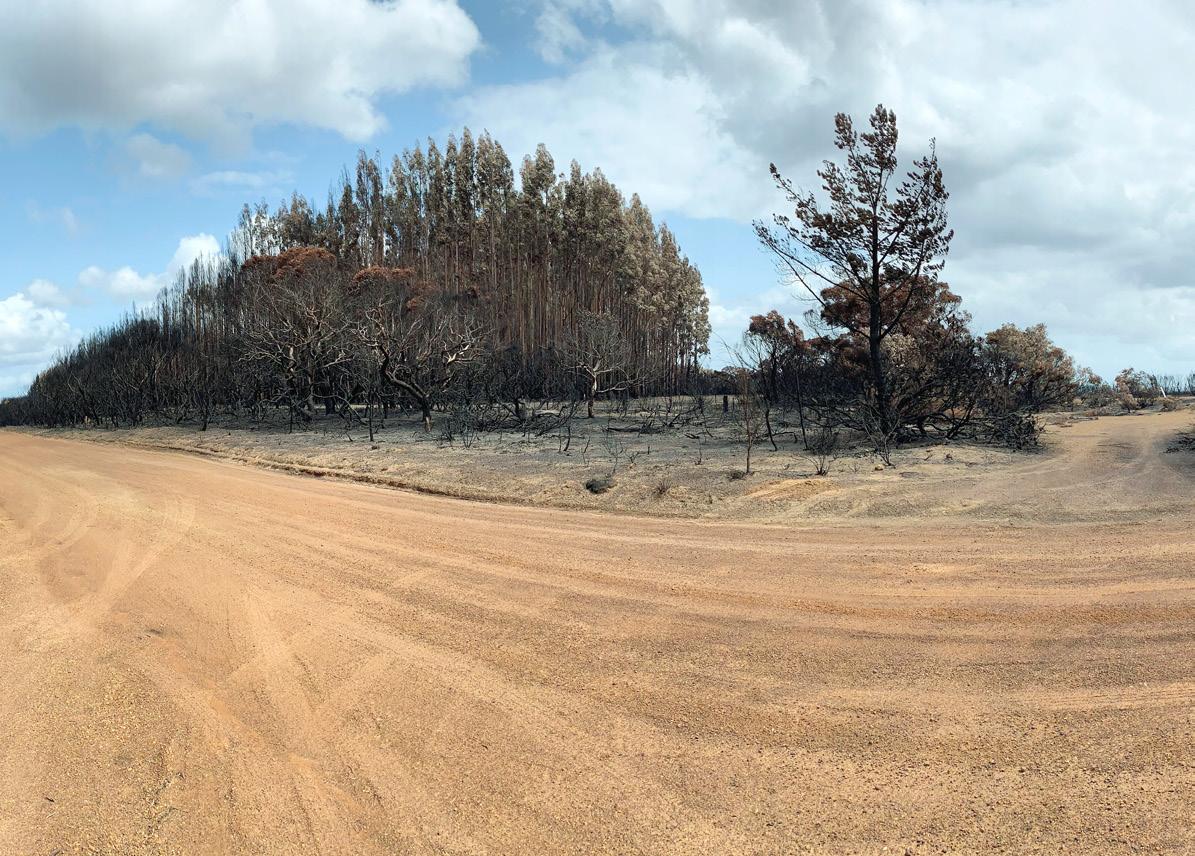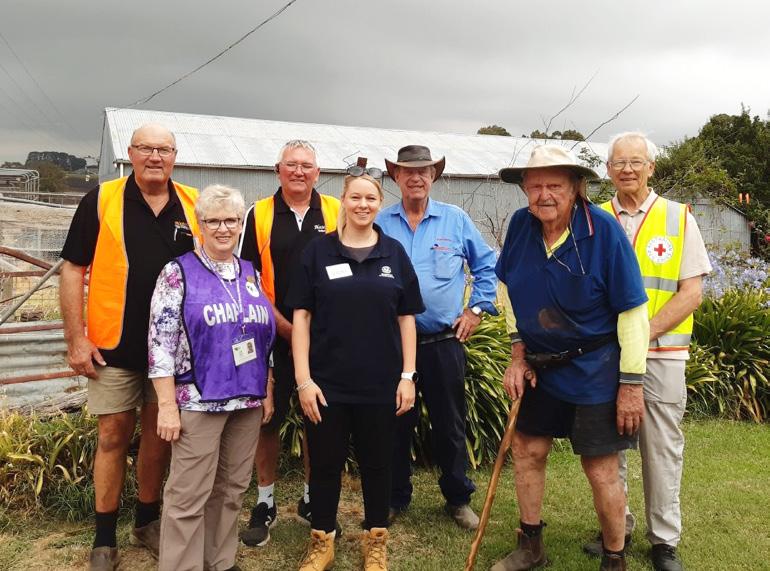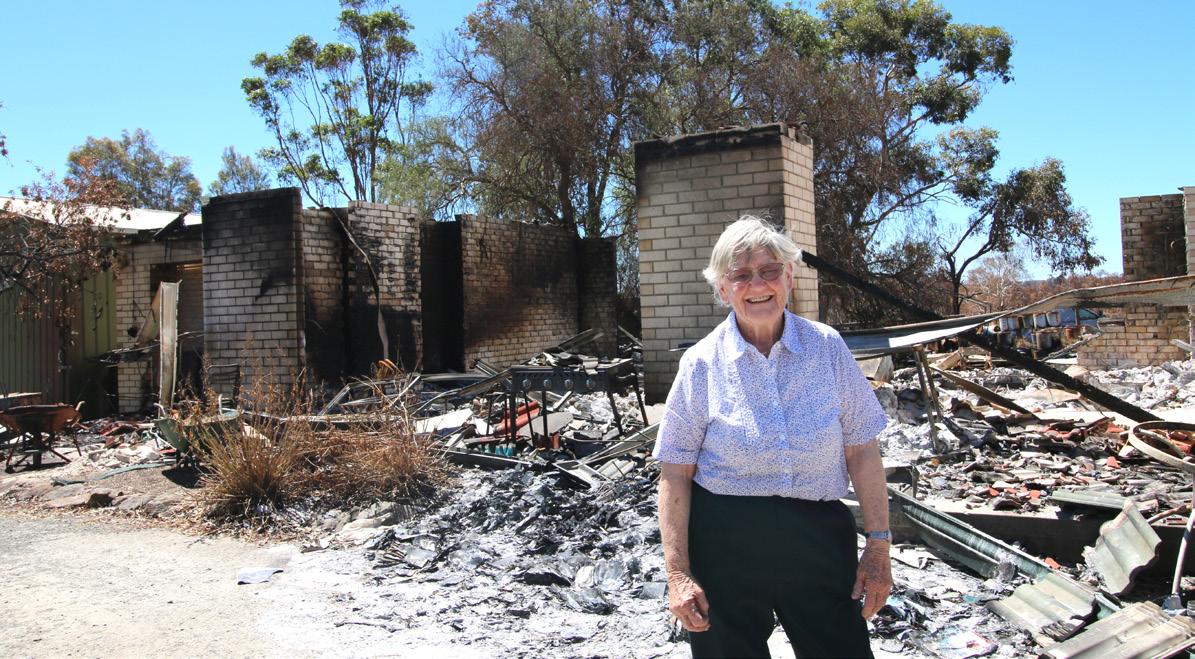
6 minute read
So where is God (and the church) in all of this?
Here in South Australia the summer’s bushfires have left our communities reeling. In the wake of loss and disaster we sometimes struggle to see God and the church at work. As Coordinator of Disaster and Recovery Ministries SA, Pastor Wendy Perkins shares her views on the topic.
Above: This is Church Road, Kangaroo Island, in late January, where not a single property was left undamaged. Photo: Felicity Amery
After a disaster one of the questions in people’s minds, if not on their lips, is, “Where was God when this terrible thing happened?” Even those who don’t purport to believe in God have been known to ask this question, a question which seems to be more prevalent in Western cultures than elsewhere.
In the wake of the tragedy of 9/11 Philip Yancey’s book, “Where is God when it hurts?” was hastily republished in a special edition, made available to as many people and as cheaply as possible. 300,000 copies were sold on the first day of its release, with all proceeds directed to the American Red Cross. An avalanche of book sales occurred, a sure sign that the book was grabbed by
many people who were asking that very question, where is God in the midst of tragedy?
When asked to summarise his book in a sentence or two by a man too busy to read it, Yancey reports that he thought for a moment and said, "I guess the answer to that question is another question. Where is the church when it hurts? If the church is doing its job – binding wounds, comforting the grieving, offering food to the hungry – I don't think people will wonder so much where God is when it hurts. They'll know where God is: in the presence of his people on earth." *
If we were asked the same question in the midst of the current tragic bushfire season in South Australia, I believe we could respond in a similar way as Yancey: God is to be found in the presence of his people, often quietly and unobtrusively caring for people in practical and pastoral ways.
Love thy neighbour Many people in the Uniting Church express their faith by performing acts of kindness for others, loving God by loving neighbour. They may be found as part of Blaze Aid teams, re-fencing properties so that stock can be returned; in Habitat for Humanity workgroups, helping with the time-consuming task of cleaning up and recovering fire damaged property; providing meals for emergency service teams and Blaze Aid volunteers; actively participating

in CFS, SES and Ambulance crews on the ground or behind the scenes.
Others demonstrate their love for God and for people by offering pastoral and spiritual support through their ministry of presence to friends, family, neighbours and strangers: they listen, they empathise, they care, they sit in silence (rather than stay away because it is all too hard to know what to say). Some of these people are serving as Disaster and Recovery Ministries chaplains, the team of around 250 trained voluntary chaplains from many denominations and other faith groups, who are found in Emergency Relief Centres, Recovery Centres and on outreach teams in partnership with the SA Government, visiting people affected by the disaster in some way.
Many Uniting Church people are praying for individuals and communities affected by the fires. Others are responding by generously donating to the Uniting Church
Disaster and Recovery Ministries chaplain Eve Marsh accompanied staff from SA Housing Authority, and volunteers from Blaze Aid and the Red Cross, on an outreach around the Lobethal area on Friday 10 January.

“…. a very weepy and distressed lady came in to the Recovery Centre today. She lived in NSW and was visiting family in the Adelaide Hills when her uninsured house burnt down. She is now homeless, without a car and was very distraught. I spent considerable time with her. She left much happier saying: ‘I came in powerless and am leaving powerful.’ What a lovely testimony to the folk at the Recovery Centre.”
– Marlene, D&RM chaplain.
SA Relief Fund as congregations, as families and as individuals, recognising that their financial gifts will be directed to projects proposed by local congregations which will assist in the recovery of their fire-affected communities.
Looking to the future In future weeks, months and even years there will be signs of new life in the midst of charred bushland. Chaplains will be continuing their quiet ministry of care and comfort. Congregations and ministers will be looking at how they support their communities for the long haul, when all the outside support agencies have left. There may be special events in these communities, sponsored by congregations with the support of donations to the UCSA Relief Fund – maybe a school holiday program for affected children, a family fun day to give people a break from the relentless clearing and rebuilding, an initiative to enhance the well-being and mental health of the community, vouchers for garden centres given to residents to help green the blackened landscape.

Balhannah Uniting Church member Alverna Ballard of Brukunga is one of several people suffering devastating loss in this summer’s raging bushfires. Her house was lost in the Cudlee Creek fire on Friday 20 December. Members of this close-knit congregation have rallied to support Alverna in many ways: towing her van to a safe place, clean-up, replacing tools, equipment and household goods, providing alternative accommodation, pastoral support, financial donations and more. Photo: Winaya Kamaputri
Across the state, from the Yorke Peninsula to the Adelaide Hills to Kangaroo Island to the Riverland – anywhere disaster has struck this summer – Christians will be demonstrating the compassion of Christ, God’s Kingdom traits of healing and reconciliation. Motivated by Matthew 6:1-4 they will be God’s hands and feet, eyes and ears in ways which are unobtrusive, even unnoticed but potently transformational in the lives of those who are touched.
At a time of crisis, many may ask, “Where is God in the midst of this suffering?” May God be seen in those who love and care in practical and pastoral ways, especially outside the walls of our church buildings.
Thanks to them, may many people know where God is when it hurts.
*From: "Where was God on 9/11?: Reflections from Ground Zero and beyond" by Phllip Yancey. Published in 'Christianity Today" October 1, 2001. Wendy Perkins coordinates the work of Disaster and Recovery Ministries SA, an ecumenical and increasingly multi-faith network of volunteer chaplains. Coordinated by the Uniting Church, Disaster and Recovery Ministries SA operates under a Memorandum of Understanding with the SA Government as part of the State Emergency Management Plan. Chaplains offer pastoral and spiritual support to people as they grapple with issues of meaning, justice, forgiveness, hope and worldview during a time of major loss.
Chaplaincy training opportunity Disaster and Recovery Ministries SA are looking to train suitable volunteers who can offer pastoral and spiritual support to people as they grapple with issues of meaning, justice, forgiveness, hope and worldview during a time of major loss. Their next 2-day training course for potential chaplains will take place on 26 & 27 March 2020 at Seacliff Uniting Church. For more information contact Wendy Perkins on 08 8236 4284 or wperkins@sa.uca.org.au, or go to trybooking.com/BICAE to book online.
Over $110,000 already given to UCSA Relief Fund
D&RM chaplains ministering in Relief, Recovery Centres + on outreach this summer
At least 2,500 hours of chaplaincy served already this summer 15 Hills congregations considering how to best work together to serve their fire-effected communities










